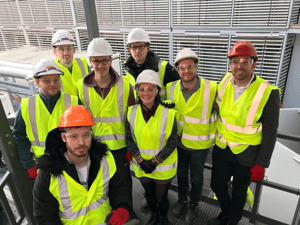We celebrated our long-awaited 4.0 release two weeks back, the biggest release we ever did since starting the company more than six years ago! We had been working on this for about six months, putting in a substantial number of extra-hours towards the end to finally get it done on time. I am very grateful for our development team who pulled this off and look forward to be building on this great achievement in the future!
If you are a client of ours you might be wondering right now if you missed something. The web platform didn’t change that much over the last couple of weeks so what am I going on about? Let me tell you the full story…
Back when we started the company, we decided to use a (at the time) fancy new database from SAP called Hana 1 as the backbone for our products. As it goes with all technology, Hana 1 was outdated – replaced by the newer Hana 2 – a short while after we started working with it. At the time when Hana 2 arrived, we were obviously more concerned with developing key-features for our platform to reach market-fit for our product than thinking about updating our infrastructure. Hence, that update got deprioritized again and again.
Fast-forward four years and you reach a point where our wildest dreams had become a reality and we are facing projects with up to 250k activities which need to be managed on a daily basis or visuals which are presenting status of up to 10k deliverables all at once. Our beloved Hana 1 was just not able to deliver the performance that we are expecting of our own solution. Additionally, SAP stopped distributing the Hana 1 over AWS, replacing it with the Hana 2, thereby effectively forcing clients to migrate to the new database before their existing license would run out. Thus, our deadline was set to end of May 2020 which is the time by which our Hana 1 license will end.
Since it was obvious that this change would be an almost epic endeavour, we started thinking about it and prototyping already beginning of 2019. For those of you who don’t understand the scope of what we needed to do feel free to picture a high-rise apartment building with people living inside for which the basement not only needs to be renovated but basically recreated to add underground parking space. Not impossible, but a lot of work!
Serious development started in October 2019. Obviously, the first thing we did was setting up a Sablono project. By constantly tracking our own KPIs on app.sablono.com we were able to forecast our current performance to decide how much additional feature development was feasible while still being able to meet the deadline. It also gave us the possibility to communicate clearly to our stakeholders which features need to be delayed until Q2-2020. Luckily, our roadmap changes were met with a great understanding for our situation.
The next big chapter started mid-March 2020 when Corona (Covid-19) hit Europe and our team moved to home office all at once. As most IT companies luckily, we were prepared for home office work even though having a couple of people joining remotely every once in a while is a whole different thing than moving a whole team to remote collaboration from one day to the other. New meetings were established to coordinate each other and the high-pressure work that we were used to during the last months continued as if nothing had happened. “Business as usual” was not an option but a must for us.
As you all know, all that hard work paid off when we were finally able to release Sablono 4.0, Today app 2.0 and Inspect app 1.8 in the night from 15-16/04/2020. I think our feelings are best described by a quote of our CTO Mathias (00:18am on MS Teams) who wrote after “pressing the buttons”:
I have to say an incredible moment. So much effort, hundreds of thousands of lines of code, half a year, a completely new server application and now it is starting to run. I almost have to cry – but no – it’s time for a high five!
Coming back to my initial question – I am going on about the fact that Sablono is now once again running on a state-of-the-art infrastructure. If you did not notice the last release that is actually a very good sign for us since it means that after rebuilding the basement the high-rise still stands and works as expected. We are very excited about having been able to develop and deploy this update successfully and look forward to all the improvements which will be possible in the future based on the hard work put into our system over the last six months!
Thanks again to our team for pulling it off and to all our clients who understood that this has priority over the next feature. Don’t worry, those features will come soon as well!


